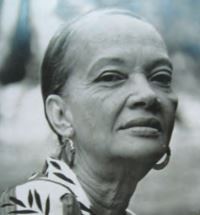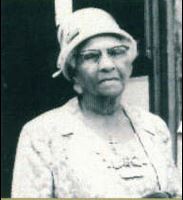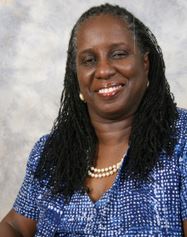Related Research Articles

The University of the West Indies (UWI), originally University College of the West Indies, is a public university system established to serve the higher education needs of the residents of 17 English-speaking countries and territories in the Caribbean: Anguilla, Antigua and Barbuda, The Bahamas, Barbados, Belize, Bermuda, British Virgin Islands, Cayman Islands, Dominica, Grenada, Guyana, Jamaica, Montserrat, St. Kitts and Nevis, St. Lucia, St. Vincent and the Grenadines, Trinidad and Tobago, and Turks and Caicos Islands. Each country is either a member of the Commonwealth of Nations or a British Overseas Territory. The aim of the university is to help "unlock the potential for economic and cultural growth" in the West Indies, thus allowing improved regional autonomy. The University was originally instituted as an independent external college of the University of London.
Dame Hilda Louisa Bynoe, DBE was the Governor of Grenada between 1967 and 1972.

Federal elections were held in the West Indies Federation for the first and only time on 25 March 1958. The result was a victory for the West Indies Federal Labour Party, which won 25 of the 45 seats in the House of Representatives.
May FarquharsonOJ was a Jamaican social worker, birth control advocate, philanthropist and reformer. She was a founder of the Jamaican Family Planning League and Mother’s Welfare Clinic, as well as the driving force behind the Old Age Pension program.

Mary Morris Knibb, MBE was a Jamaican teacher, social reformer and philanthropist. She founded the Morris Knibb Preparatory School and donated a building which is used as the headquarters of the Moravian Church in Jamaica as well as land for construction of a community center. Morris Knibb was a women's rights activist and the first elected councilwomen in Jamaica. She was the first woman to vie for a seat in the House when Universal Suffrage was granted to all Jamaicans.

Dame Elsie Payne (1927–2004) was a teacher and following independence she became the first Barbadian-born principal of Queen's College in Bridgetown. She was the first woman knighted in Barbados for her long dedication to education and the nation.

Maymie de Mena was an American-born activist who became one of the highest-ranking officers in the Universal Negro Improvement Association (UNIA). She has been credited with keeping the organization alive after Marcus Garvey's conviction for mail fraud and deportation from the United States.

Marie Grace Augustin, OBE, commonly known as Grace Augustin, was a Saint Lucian businesswoman and politician. After attaining a nursing and midwifery degree, she studied law, but was refused permission to take a bar examination based on her gender. Instead, Augustin became the first woman in Saint Lucia to manage a large estate, becoming a planter. She was the first woman to be nominated as a parliamentarian in St. Lucia and become the first female member of the legislature.

Constance Winifred Mark, MBE, BEM was a Jamaican-born community organiser and activist. She served as a medical secretary in the Auxiliary Territorial Service in World War II. After moving to England in the early 1950s, she became an activist for West Indians in London, after being denied her British Empire Medal. She worked to gain recognition for Black service personnel who were overlooked for their services and co-founded the Mary Seacole Memorial Association to bring recognition to the accomplishments of the noted Jamaican nurse.

Dame Nellie Robinson, DC, MBE, was an Antiguan teacher and school founder who was a pioneer in education. She broke down colour and class barriers, believing that all children should have access to learning. As of 2017, she was the only woman to have received the Order of the National Hero from the government of Antigua and Barbuda.
Shirley Miller, OJ, CD, QC is a Jamaican attorney and one of the first women admitted as Queen's Counsel in the Caribbean. Admitted to the inner bar in 1971, she became the first Queen's Counsel in Jamaica and has served in numerous capacities, including as head of the Legal Reform Department and on the Electoral Advisory Committee. She served on a committee of three to review Jamaica's Charter of Fundamental Rights and Freedoms and was honored as a commander in the Order of Distinction, as well as receiving the Order of Jamaica for her contributions to legal reform.
Victoria Jubilee Hospital initially known as the Victoria Jubilee Lying-In Hospital was founded in 1891 and opened to the public in 1892 in Kingston, Jamaica. The current facility, the largest maternity hospital in the English-speaking Caribbean, features 248 beds and delivers around 8,000 babies annually.

Heather Little-White was a Jamaican nutritionist, journalist and disabilities activist. After earning degrees in nutrition and communication, she worked with Grace Kitchens and founded the television program Creative Cooking to share sound nutritional advice throughout the country. As a journalist, besides writing articles on nutrition, she wrote a weekly column on sexuality for the Outlook Magazine segment of The Gleaner newspaper. After working with the Reggae Boyz, Jamaica's national football team, as a nutrition consultant, Little-White became paralyzed from the waist down after being shot during a robbery attempt. Becoming an advocate for people with disabilities, she focused on bringing awareness, accessibility, and assistance to Jamaicans living with disabilities. She was honored as an officer in the Order of Distinction in 2001.
Ena Collymore-Woodstock, OD, MBE is a Jamaican barrister and magistrate who throughout her career broke many barriers for women. After being orphaned, she joined the Auxiliary Territorial Service and trained as a radar operator, serving in Belgium and Britain. When the war ended, she earned a law degree and returned to Jamaica to become the first woman Court Clerk, Crown Solicitor, and Resident Magistrate. When the Juvenile Courts were established in the country, she served as its chair from 1964 to 1967 and then as a Senior Resident Magistrate until her retirement in 1977. Post-retirement, she served as magistrate for the Turks and Caicos and Anguilla. For her contributions to the development of Jamaica, she was honored as a member of the Order of the British Empire and Jamaica's Order of Distinction.

Isabel Ursula Teshea, TC was an Afro-Trinidadian social worker, human rights activist, and politician. One of the founders of the People's National Movement, she served as vice chair of the party and was the first woman to hold the office. When Trinidad and Tobago gained its independence from Britain, she ran as a candidate, becoming the first woman elected in the newly established House of Representatives. She became the first woman cabinet Minister and later ambassador for the country. Posthumously, she was awarded the Trinity Cross, the highest honor of the country.
Barbara GloudonOD, OJ, IOJ is an Afro-Jamaican journalist, author, playwright and theatre chair. After a distinguished career as a journalist, where she was honored with two Seprod Awards from the Press Association of Jamaica and as an officer in the Order of Distinction, Gloudon began working as a scriptwriter for the Little Theatre Movement (LTM) and writing radio drama. She hosted a radio talk show for thirty years and became chair of the LTM. Having received numerous awards and honors, Gloudon was granted the Order of Jamaica in 1992 and in 2012 became a fellow of the Institute of Jamaica.

Gema Ramkeesoon was a Trinidadian and Tobagonian social worker and women's rights activist who was one of the early pioneers of the women's movement in Trinidad and Tobago. She was honored for her social service work as a member of the Order of the British Empire in 1950 and received the gold Hummingbird Medal from Trinidad and Tobago in 1976.

Enid Gonsalves, OD was a Jamaican teacher and community activist from Hanover Parish, Jamaica. She was recognized throughout her career with many distinctions including the Governor General's Achievement Award and the Prime Minister's Medal for Community Service and Education. In 2008 she was honoured as an officer in the Order of Distinction and the following year, received the Holy See's Medal of Good Merit.

Hazel Monteith, O.D., J.P. was an Afro-Jamaican consumer rights advocate, radio personality and social worker. Graduating from the first course in social work offered by the University of the West Indies, Monteith worked for twelve years as a traveling field agent coordinating social welfare projects for the Jamaica Federation of Women. In 1972 she became a regional officer at the Council of Voluntary Social Services and was tasked with creating the Citizen's Advice Bureau. Through innovative programs, she developed training and advice centers and radio broadcasts to help citizens with a wide variety of issues from how to register vital records, to employment training, to where to obtain assistance for household goods. She was honored as an officer in the Order of Distinction in 1982 and subsequently appointed a Senator from 1986 to 1989.
Maureen Warner-Lewis is a Trinidadian and Tobagonian academic whose career focused on the linguistic heritage and unique cultural traditions of the African diaspora of the Caribbean. Her area of focus has been to recover the links between African cultures and Caribbean cultures. She has been awarded multiple prizes for her works, including two Gordon K. and Sybil Lewis Awards, the Gold Musgrave Medal of the Institute of Jamaica, and was inducted into the Literary Hall of Fame of Tobago.
References
Citations
- 1 2 3 4 Anglican High School 2014.
- ↑ Williams 1987, p. 28.
- ↑ Now Grenada 2016.
- 1 2 3 Charles 2006.
- 1 2 The Daily Gleaner& 5 November 1972, p. 44.
- ↑ The Daily Gleaner& 12 November 1972, p. 37.
- ↑ The Daily Gleaner 1973, p. 38.
- ↑ The New Today 2015.
- ↑ Louison 2015.
- ↑ Now Grenada 2015.
- ↑ The New Today 2016.
- ↑ World Association of Girl Guides and Girl Scouts 2017.
Bibliography
- Charles, Karen A. (September 2006). "AHS Celebrates 90 Years". AHS Past Pupils. St. George's, Grenada: Anglican High School Past Pupils Association. Archived from the original on 5 August 2016. Retrieved 5 January 2017.
- Louison, Delroy (21 March 2015). "Anglican High Excels". St. George's, Grenada: Grenada Broadcasting Network. Archived from the original on 24 May 2015. Retrieved 5 January 2017.
- Williams, Colleen (10 March 1987). "Hermione McKenzie her interest is people". Kingston, Jamaica: The Daily Gleaner/Flair Magazine . Retrieved 5 January 2017– via Newspaperarchive.com.

- "Anglican High school 100th project". St. George’s, Grenada: The New Today. 4 December 2015. Archived from the original on 13 December 2015. Retrieved 5 January 2017.
- "CIBC FirstCaribbean helps Anglican High School commemorate 100th Anniversary". St. George's, Grenada: Now Grenada. 12 October 2014. Archived from the original on 14 October 2016. Retrieved 5 January 2017.
- "The Girl Guides Association of Grenada". WAGGGS. London, England: World Association of Girl Guides and Girl Scouts. 2017. Archived from the original on 5 January 2017. Retrieved 5 January 2017.
- "Grenada Carnival Prospects Gloomy". Kingston, Jamaica: The Daily Gleaner. 18 February 1973. Retrieved 5 January 2017– via Newspaperarchive.com.

- "History". AHS Grenada. St. George's, Grenada: Anglican High School. 29 October 2014. Archived from the original on 5 January 2017. Retrieved 5 January 2017.
- "Mystery blaze No. 5 guts Grenada school". Kingston, Jamaica: The Daily Gleaner. 5 November 1972. Retrieved 5 January 2017– via Newspaperarchive.com.

- "SAASS and AHS are the Intercol 2016 Champions". St. George’s, Grenada: The New Today. 31 March 2016. Retrieved 5 January 2017.
- "School Food Lab Refurbished by CIBC FirstCaribbean". St. George's, Grenada: Now Grenada. 17 September 2015. Archived from the original on 5 January 2017. Retrieved 5 January 2017.
- "Students on the march". Kingston, Jamaica: The Daily Gleaner. 12 November 1972. Retrieved 5 January 2017– via Newspaperarchive.com.
